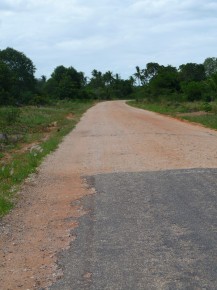What do you think about when you think about research? Do you think of stereotypes – such as academics looking like Einstein in the picture below with the blackboard? Dusty theses sitting on library shelves?

Or do you think about the kind of exciting, innovative initiatives and companies – TED, Google and the DFID-funded "What's Your Bright Idea?" contest spring to mind - that have broken down our preconceptions and shown us how thrilling it can be when creative research is put into extraordinary action?
I've been thinking a lot about the latter after going last month to review a DFID-funded programme in Mozambique.
The Africa Community Access Programme (AFCAP) researches how to use local materials and improved techniques in order to make roads cheaper to build and easier to maintain.

I visited some fascinating demonstration sites, where each kilometre tested a different blend of materials and techniques. With much of the country's Route 1 running along the coast, the project was trying out different ways of using sand to construct high-quality roads.
The goal of this kind of research isn't just to build something at a lower cost. It has impacts for real people – including the poorest and most vulnerable. It means that traders can transport goods and access markets more cheaply, and children, mothers and the elderly can access schools and hospitals more easily.
In Mozambique, we saw that a number of small- and medium-sized enterprises had sprung up along the roads. Better, more long-lasting housing is being built. And people are expanding the size of the fields they're cultivating because they can get their goods to market.
While the initial investments in research are relatively small, the returns on those investments can be enormous – with tens of thousands of kilometres of roads being built and maintained differently across Africa, saving millions of dollars, and improving the lives of tens of millions of people.
We calculated that the rate of return to our investment in AFCAP in Mozambique will be 30-60%. That's like investing $100 and getting $130-160 back a year later. You won't find those kinds of rates for savings and investments in the current climate.
DFID is at the cutting edge of this kind of research. We recently won 'Best Technological Breakthrough' at the Climate Week Awards for a project to develop drought-tolerant maize in Africa. You can find out more, and access information about research funded by DFID, at our Research For Development site.
So now when I think about research, I think about the peri peri seller I met on the road to Inhambane who has customers coming past all day long, all year round. Not a wild-haired professor in sight.

Recent Comments